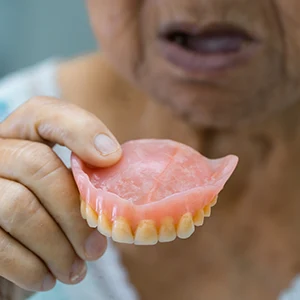Request Appointment
Kissimmee

New Patients Only: (407) 635-1196

All Other Callers: (407) 932-2273
Saturday By Appointment
Schedule Now

Call Us
Call Us Now

For millions of denture wearers, one of the most common challenges is keeping dentures secure throughout the day. Adhesive glue for dentures offers a practical solution to enhance fit, comfort, and confidence. At Parkway Dental Care, our dental professionals help patients choose the right denture adhesive for their unique oral needs.
This guide will explain how denture adhesives work, when to use them, the different types available, and provide expert safety tips.

Adhesive glue for dentures is a specially formulated product designed to hold full or partial dentures securely. Available in various forms, creams, powders, pads, and strips, these adhesives create a thin, durable layer between the denture and gums, improving suction and reducing slippage.
These products are generally made from non-toxic, FDA-approved materials, and when used correctly, they are considered safe for daily wear.
According to the American College of Prosthodontists, denture adhesives may enhance retention and stability when used alongside well-fitting dentures.
Even custom-fitted dentures may loosen over time due to bone resorption or daily wear. Adhesive glue for dentures offers several key advantages:
Each type of adhesive glue serves different preferences and denture styles. At Parkway Dental Care, we help patients choose based on their comfort and oral anatomy.
Cream adhesives are easy to apply, offer strong adhesion, and provide cushioning. They are ideal for full-day use.
Powders are sprinkled on damp dentures and activated by saliva. They provide a less messy alternative to creams.
Pre-cut adhesive pads are convenient for travel and first-time users. They provide a clean, mess-free experience.
Proper application is key to achieving a firm, comfortable fit. Here's how to apply the most common types:
Note: Always follow the instructions provided with your specific adhesive product to avoid overuse or reduced effectiveness.
Removing denture adhesive properly helps prevent gum irritation and maintains hygiene.
Yes, adhesive glue for dentures is safe for most patients when used as directed. However, long-term or excessive use without professional guidance can cause issues such as:
At Parkway Dental Care, we advise patients to consult with our dental team before starting any new adhesive to ensure it aligns with their denture fit and oral health needs.
Denture adhesive is not a substitute for an ill-fitting or broken denture. Avoid use and schedule a dental visit if:
In such cases, a denture reline, adjustment, or replacement may be necessary.
Adhesive glue for dentures can significantly improve denture stability, comfort, and confidence. especially when applied correctly and used in conjunction with well-fitted appliances. At Parkway Dental Care in Kissimmee, FL, we’re committed to helping you enjoy the best possible denture experience with personalized solutions and expert care.
If you’re struggling with loose dentures or unsure which adhesive is right for you, book a consultation with our team today. We’re here to help you smile with comfort and confidence.
Most adhesives last 12–16 hours, but this can vary based on saliva, eating habits, and the type of product used.
Yes. Adhesive can be used on either or both, depending on your needs.
Not always. Well-fitted dentures often stay in place without adhesive. However, adhesive may add confidence in social or eating situations.
Daily use is safe if your dentures are properly maintained and cleaned. If you find yourself relying heavily on adhesive, consult your dentist.
While denture adhesives are generally safe when used as directed, long-term misuse, such as overuse or using outdated zinc-based adhesives, may cause gum irritation or, in rare cases, zinc toxicity.
If adhesive oozes out from the sides of your denture when inserted, you're likely using too much. Excessive use may also lead to difficulty cleaning the denture and gum surface, increasing the risk of infection.
In such cases, a professional reline, adjustment, or new denture may be needed.